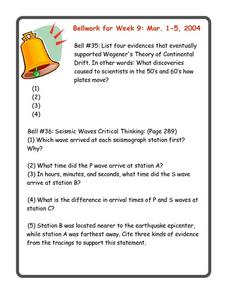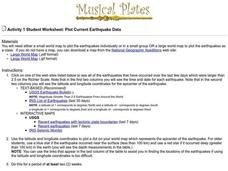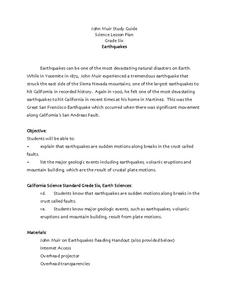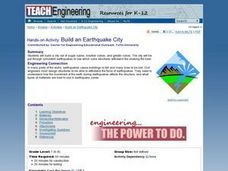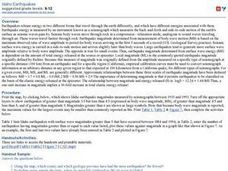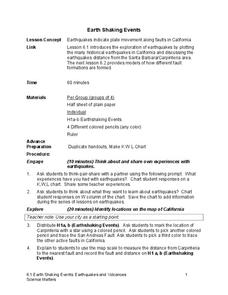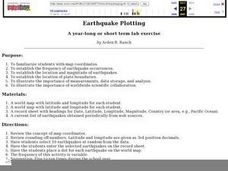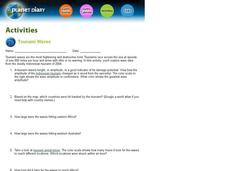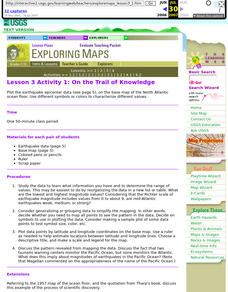Curated OER
Evaluating an Illinois Earthquake
Students examine the frequency of earthquakes in Illinois. They discover the distribution of earthquakes in the Midwest. They also practice reading measurements from the Richter scale and Mercalli Intensity scale.
Curated OER
Bellwork for Week 9-Earthquakes and Continental Drift
In this earthquake and continental drift worksheet, learners answer five questions about continental drift, seismic waves and earthquake safety.
Science Matters
Richter Scale
The 12th lesson in a series of 20 opens with a demonstration of exponential functions using pasta. This concept is connected to the Richter Scale, which is also an exponential function. Scholars compare the exponential scale that...
Curated OER
Determining Epicenter Distance
In this earthquake instructional activity, learners determine the distance of the epicenter based on the S-waves and P-waves on a seismograph. This instructional activity has 4 problems to solve.
Curated OER
Plot Current Earthquake Data
Students review earthquakes larger than 2.5 that have occurred over a span of several days using a given website reference. For this geology lesson, students plot epicenters on a world map and depth of the quake. All necessary...
Curated OER
Stressed Out!
Students identify methods for detecting and locating earthquakes and analyzing seismic data. In this earthquake lesson students simulate the action of P and S waves.
Curated OER
Earthquakes
Sixth graders explore reasons for earthquakes. They discuss and describe the types of faults. Using the internet, 6th graders research a specific location of a former earthquake. They describe the damage, magnitude, the epicenter,...
Curated OER
Build An Earthquake City
Students work together to build an earthquake city. They simulate the shaking during an earthquake to discover if their structure is built well enough. They discover how engineers complete these types of tests to develop better...
Curated OER
Idaho Earthquakes
Students examine the types of earthquakes that occur in Idaho. In groups, they compare and contrast the types of energy released and how they affect the movement of the Earth. To end the activity, they analyze a map showing the...
Curated OER
Exploring Earthquakes in Space and Time Through the Internet and a Geographic Information System
Students examine the frequency and distribution of earthquake epicenters and compare these epicenters to the distribution of plate boundaries and cities.
Curated OER
Seismic Waves
Students work together to discuss seismic waves. Using seismograph records, they practice determining where the epicenter of the earthquake was located. They identify and illustrate the three types of waves and how the records can be...
Curated OER
Earthquake Depth
Students research and locate earthquake epicenters on a map using latitude and longitude. They determine if the depth of an earthquake has any relationship to the distance from a plate boundary.
Curated OER
Locate-a-quake
Student, use seismic readings of the same earthquake from three recording stations and locate the epicenter of an earthquake on a map.
Curated OER
Seismic Waves
Students identify the four types of seismic waves, their characteristics and effects. Then they predict the level of damage each wave might cause in a residential area and test their predictions against several computer animations. ...
Curated OER
Shake, Rattle and Roll
Sixth graders explore the causes and effects of earthquakes. They also collect and analyze data in graphs. They also use the Internet to research earthquakes
Curated OER
How Tsunamis Form
In this earth science worksheet, students read and study facts about tsunami and earthquakes to complete 8 short answer questions that follow.
Curated OER
Earthquakes and Seismic Waves
Young scholars investigate the Richter scale and seismology in a teacher-led lab in which they are introduced to the concept of seismic waves and epicenter location. They further investigate the inner workings of a seismograph and...
Science Matters
Earth Shaking Events
The world's largest measured earthquake happened in 1960 in Chile, reaching a terrifying 9.5 magnitude on the Richter Scale. The second lesson plan in the 20-part series introduces earthquakes and fault lines. Scholars map where...
Curated OER
GED Vocabulary: Earth and Space Science
In this earth and space science activity, students complete a crossword puzzle given nine terms related to earthquakes, glaciers, the solar system, and sources of energy.
Curated OER
Earthquake Plotting
Students become familiar with map coordinates. They establish the frequency of earthquake occurrences and study the location and magnitude of earthquakes. To establish the location of plate boundaries.
Curated OER
Borah Peak Earthquake
students use the internet, an atlas map, and other sources to explore a map of Idaho. They locate the Lost River Range and Mt. Borah. Students read the atlas map to locate earthquake faults, find the magnitude, fault, and epicenter of...
Curated OER
Tsunami Waves
In this tsunami waves worksheet, learners explore data from the Indonesian tsunami of 2004 and answer ten questions about the data. They draw conclusions about the devastation and destruction based on the amplitude and speed of the tsunami.
Curated OER
Earthquake on the Playground
Students investigate earthquakes by examining chart data. In this disasters instructional activity, students identify the waves that are recorded when an earthquake arises by reading sample graphs in class. Students...
Curated OER
Lesson 3 Activity 1: On the Trail of Knowledge
Students plot the earthquake epicenter data on the base map of the North Atlantic ocean floor using different symbols or colors to characterize different values.



